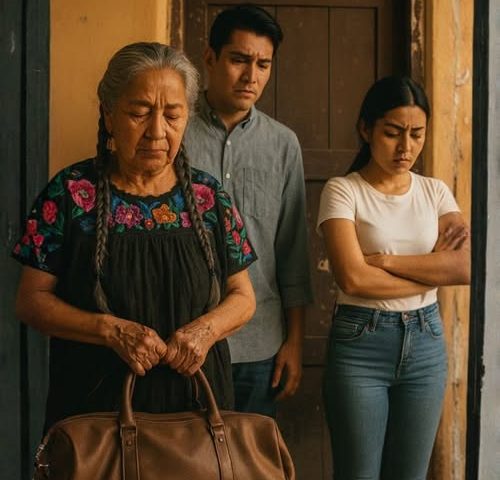When I turned fifty-two, I received a substantial inheritance. I was about to tell my son about it, but as I reached his bedroom door, I froze what I heard from inside shattered me. They were talking about how to drive me out of my own home.
It was a foggy morning in Quezon City. December skies hung heavy and gray, and a cold breeze slipped through the cracks of our little house. I clutched my worn shawl and paused outside my son Marco’s room.
In my hands was a small bank booklet over half a million pesos, left to me by my late uncle from Cebu. I had planned to use it to renovate the house, build Marco and his family a nicer room, and keep some aside for emergencies.
But instead of cheerful voices, I heard this:
“Honey, when is your mom leaving?” Denise, my daughter-in-law, said impatiently. “She’s always around. This house is too small. It’s awkward when guests visit.”
“Denise… she’s my mom,” Marco murmured weakly. “She has nowhere else to go.”
“When we got married, she said she couldn’t give us anything except an old TV. And now we’re supposed to adjust for her? That’s not fair.”
– Leave it, then. I’ll find her another place. We’ll just send her money every month.
I felt my knees weaken.
I’d lived in Metro Manila for over thirty years since leaving Leyte, raising Marco alone after my husband died in a boating accident. I scrubbed laundry, sold groceries, worked as a maid—anything to put him through school. The house he lived in now? I built it through twenty years of sacrifice.
I thought growing old meant peace and gratitude. But to Denise, I was just a burden.
Silently, I slipped the bank booklet into my pocket. I left the house without a sound, like a ghost leaving her own life behind.
That night, I went to Laguna and rented a tiny apartment—fifteen square meters, with a window, a few plants outside, and most importantly, peace.
I wasn’t angry. I just needed to breathe. For the first time, I chose myself.
My new life began there.
Each morning, I walked to the market, made coffee, and watched YouTube dramas. I joined a group of elderly women for Zumba in the plaza. At noon, I’d read a book; at night, I watched Nora Aunor and Vilma Santos films.

Quiet. Steady. Content.
Marco called sometimes. I never answered. He texted, “Mom, where are you?”—I deleted the messages. No more drama. No more explanations.
I’d given my life to others. Now I was giving it back to myself.
Two months passed.
Back in Quezon City, something shifted. Marco became quieter. Denise softened. But the one most affected was my grandson, Jio, just seven years old.
He no longer laughed. He barely ate. Every morning, he asked, “Where’s Grandma?”
Marco and Denise stayed silent, but they knew. The warmth was gone—the hand that tucked him in, the voice that whispered prayers. The only one who loved him unconditionally was missing.
Eventually, Marco went to Leyte to see my cousin Lourdes. His voice broke as he said, “Auntie… it’s my fault. I didn’t stand up for Mom.”
Lourdes showed him a photo—me, in sandals, smiling among elderly women at the plaza. “She’s happy now,” she said. “Finally.”
The next day, Marco found my place. There were gumamela flowers by the door, laundry on a wire, the faint smell of overcooked food.
Knock, knock.
I opened the door, ladle in hand.
“Marco…” I muttered.
He couldn’t speak at first; his eyes filled with tears.
“Mom, I’m sorry. Please come home. Denise and I are sorry.”
I turned and poured tea into two cups, placing them on the table. We sat in silence.
“I’m not angry,” I said softly. “But I’ll stay here.”
“Why, Mom?”
I met his eyes—calm but firm.
“Because I’m just learning to love myself. And I won’t stop now.”

A week later, Jio visited. The moment he saw me, he ran into my arms.
“Grandma, don’t ever leave again,” he cried, handing me his favorite boiled mushrooms.
Since then, Marco brings Jio every weekend. Sometimes Denise comes, helping me cook. We’re not close yet—but she’s trying, and that’s enough.
One day, Marco called.
“Mom, I made adobo. Can I bring you some?”
I smiled. I didn’t answer right away. But I knew—it wasn’t guilt speaking this time. It was love.
The money remains untouched in the bank. I never used it out of spite. It became my peace offering to myself.
Because I’ve learned this: true love isn’t about endless giving. It deserves respect, boundaries, and balance.
And this time, I won’t let anyone make me disappear again.
